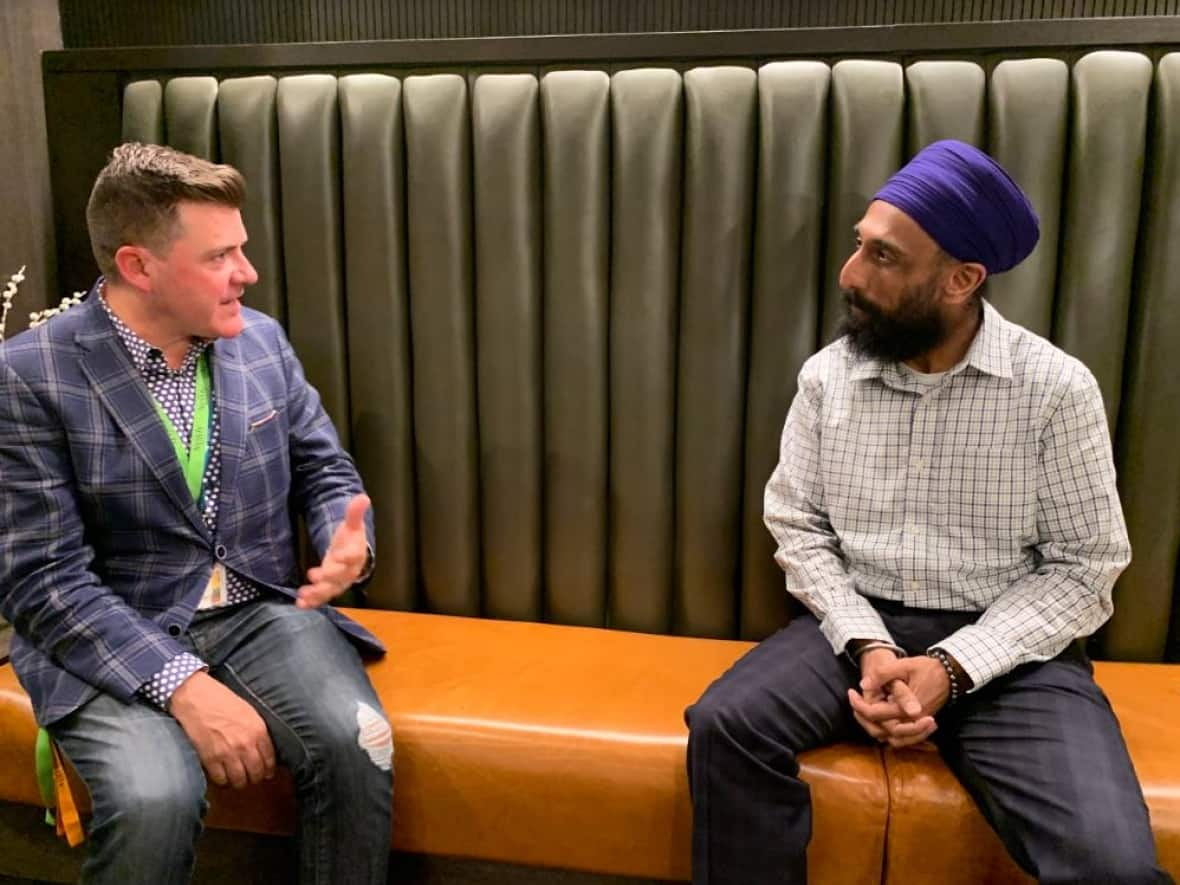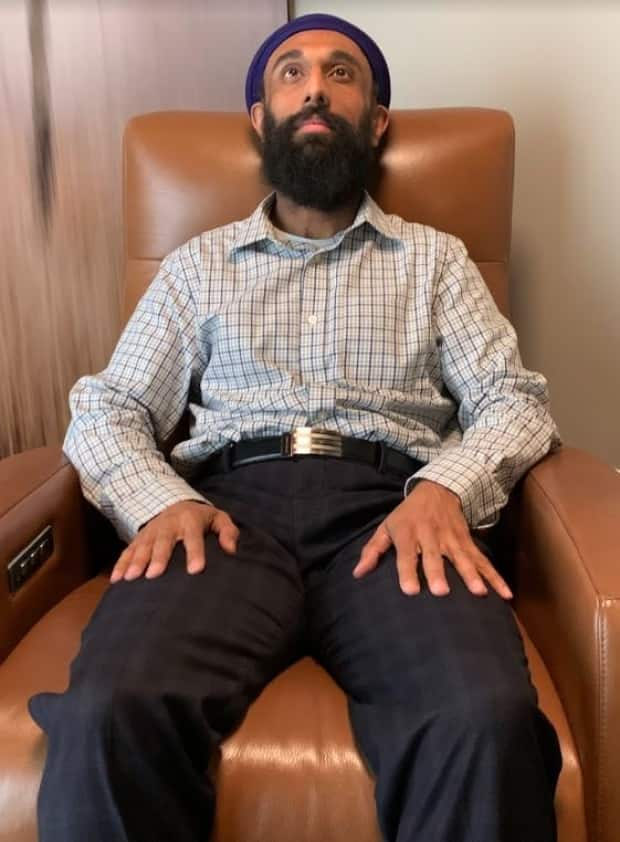Many first responders struggle with PTSD. Limited research suggests psychedelics may help

Jas Kainth didn't want to walk through the doors of the Calgary police psychological services building. For years, colleagues had referred to it as "Dr. Bonkers."
But he wasn't sleeping. He lacked empathy. And he was thinking about self-harm.
"When I actually did go to seek help and I decided it's time, I actually used the illusion of a health check to go in to talk to psychological services," he told Dr. Brian Goldman, host of CBC's White Coat, Black Art.
"When I sat down, I said, 'Just so you know, I don't want to waste your time. I'm not here for the health check. I need help and this is what I need help with.'"
Now a staff sergeant with Calgary Police Services, Kainth said he needed help after dealing with an incident while working in the child abuse unit, something he hasn't been able to speak about publicly yet.
He would learn that he was stuck in what's known as a trauma negative loop. Though it may have been triggered by the child abuse case, its roots stretched to when he was sexually assaulted himself at six years old.

"It just compounded and compounded and compounded," he says.
"So whenever I endured stress such as interviewing a victim of child abuse, I would disassociate from that and focus on just the job that needed to be done … I tried my best to push it away and soldier on and get the job done like everybody expected me to."
Kainth was diagnosed with complex post-traumatic stress disorder (PTSD). He tried seeing therapists, but it wasn't working.
'I used it and it helped'
After reading about ketamine, he reached out to staff at The Newly Institute in Calgary to be in the first cohort of an intensive, four-week outpatient program that involved combining ketamine treatments with therapy.
Ketamine, an anaesthetic that was once a party drug, has been shown to work as an antidepressant for some.
"I've never smoked a cigarette, I've never smoked marijuana, I've never finished an alcoholic drink," Kainth says. "I went from zero to, 'I'm going to use a psychedelic that's going to alter my mental state.'
"But that's desperation. I used it and it helped — and I'm here."
Though Kainth found ketamine worked for him, there is still limited scientific research on the use of psychedelics in long-term clinical treatment.
But clinicians and researchers are studying whether it may be a new avenue.
'Trauma after trauma'
Since last year, staff at The Newly Institute have worked with first responders like Kainth and veterans with complex mental health issues.
"Many just have trauma after trauma after trauma," says Dr. Robert Tanguay, chief medical officer and co-founder of The Newly Institute, a private, for-profit mental health network of clinics.
That's why he says it's important to start treating incident trauma but also focus on a patient's earliest trauma memory.
One of the ways that staff at the therapy centre do that is through an intensive outpatient program that pairs ketamine treatments with psychotherapy.
"What ketamine is — and maybe what we'll learn about psilocybin and MDMA — they are catalysts," says Tanguay, adding that ketamine can help reduce symptoms of depression.
"They can turn the fight or flight off immediately to allow someone to breathe."
The clinical use of psychedelics alongside psychotherapy is a growing area of research for PTSD treatment, especially among first responders.
And studies have shown that first responders have higher-than-average rates of PTSD.
Nine per cent of Canadians will get PTSD at some point in their lives, according to a 2018 study. Among police officers, it's more like 29 per cent, according to a study of two police departments cited by the Centre for Addiction and Mental Health.
Dr. Peter Silverstone, a professor of psychiatry at the University of Alberta and author of The Promise of Psychedelics, cautions that percentages of first responders with PTSD can vary widely in studies. But he notes that it is often a considerable percentage.
"It is a very significant minority," he says.
Experts say there is also the risk of suicide or substance use among this population. And many first responders with PTSD often relive their traumatic memory, explained Dr. Ruth Lanius, a professor of psychiatry and the director of the PTSD research unit at Western University.
"They're plagued with these reliving episodes, where they feel like they're back at the scene of the trauma," she said. "They have real difficulty being in the present; often they avoid their feelings because they're so intense."
She says some have childhood trauma, but others may be dealing with guilt or shame because "they couldn't do more."
"This often first comes up when individuals in this population see children die or they can't save kids," she said. "That often brings the PTSD to the forefront, I find."

Silverstone says there are very few treatments for PTSD that are effective.
That's why many are intrigued by the possibility of psychedelics, he said, but he recognizes there is still a lot of research that needs to be done in this area.
"If I had a family member who had PTSD and they had an option to try this, I would recommend it to them. But I would also say that our evidence base is still quite thin," Silverstone says.
Authors of a study recently published in the journal Cureus found that PTSD-specific clinical trials are "still scarce."
They went on to say that psychedelics could be "a revolutionary method of treating PTSD" but that more research is needed to figure out their safety and efficacy as treatment — and who they would work best for.
Lanius says there's emerging evidence that psychedelics are helpful but emphasizes that they don't work for everyone.
"It's unlikely the answer to everything — nothing is," she says. "But the more treatments we have, the more we can personalize those treatments, especially in that substantial population that don't respond to the mainstream treatments."
Canada a research leader
Ongoing research into other psychedelics like psilocybin or methylenedioxymethamphetamine (MDMA) as treatment for those with PTSD is still in the early stages.
Silverstone, who last year helped found the biopharmaceutical company Zylorian, expects more definitive evidence on these drugs in about two to three years.
Provincial governments in Alberta, British Columbia and Ontario are already investing in psychedelic research, he says.
"Canada is leading the way because America has so many limitations on this type of research that it allows Canadian companies to come to the fore," he says.
And the Newly Institute is one of them. Tanguay and the Newly Institute just signed an agreement with WorkSafeNB in New Brunswick to study how ketamine treatments may be able to help workers.
"[Our] ultimate goal is to get [them] back to a healthy life, get back to work and build resiliency to keep it that way," Tanguay says.
And for Kainth, after completing the initial outpatient program at the clinic, he says he's feeling better now. But he's still working through his trauma.
Ketamine has helped him to see people differently, he says, and has changed how he interacts with people as a police officer.
He says there was a lot of preparation, treatment and support to get him to the point where he can finally share what happened to him.
"My motivation for coming forward is to let one person know that they're not alone."

 Yahoo Movies
Yahoo Movies 
